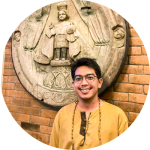Recipients of CMRS-CEGS Supplemental Recruitment Fellowships
2022-23
 Emily Ann Ostlander is an incoming Art History MA-PhD student at UCLA. In Winter 2022, she completed her bachelor’s degree in both Art History and Urban Design & Architectural Studies at New York University, where she wrote her honors thesis on the androgynous representation of Saint John the Beloved during the early modern period in Europe. In addition to her studies in New York, Emily has studied and worked internationally in Florence, Italy and Seoul, South Korea. Her combined experiences have inspired her to pursue the study of art history by following a transcultural narrative, specifically through topics such as the phenomenology and mysticism present in Buddhist and Christian early modern works of art.
Emily Ann Ostlander is an incoming Art History MA-PhD student at UCLA. In Winter 2022, she completed her bachelor’s degree in both Art History and Urban Design & Architectural Studies at New York University, where she wrote her honors thesis on the androgynous representation of Saint John the Beloved during the early modern period in Europe. In addition to her studies in New York, Emily has studied and worked internationally in Florence, Italy and Seoul, South Korea. Her combined experiences have inspired her to pursue the study of art history by following a transcultural narrative, specifically through topics such as the phenomenology and mysticism present in Buddhist and Christian early modern works of art.
 Earl John Cedo Hernandez is an incoming PhD student from the Archaeology Interdepartmental Program of the Cotsen Institute of Archaeology at the University of California Los Angeles. He is an anthropological archaeologist from Bicol, Philippines. As a Bikolano anthropologist, he is broadly interested in research involving conversations in the anthropology of religion, the archaeology of Spanish colonialism, and engaged museum program which focuses on providing voices to relegated local/indigenous culture and history. Before coming to UCLA, he was the curator of the Museo de Isarog at the Partido State University where he advocated for co-creation and co-curation programs working with colleagues, scholars, students, and community. Since 2018 he has been working with the Bicol Archaeological Project, an interdisciplinary archaeological and heritage program aiming to understand indigenous/local responses to Spanish colonialism during the early modern period. Earl is interested in using remote sensing to understand human-environmental interactions, landscape, and land-use changes during the early modern period in Bicol and beyond.
Earl John Cedo Hernandez is an incoming PhD student from the Archaeology Interdepartmental Program of the Cotsen Institute of Archaeology at the University of California Los Angeles. He is an anthropological archaeologist from Bicol, Philippines. As a Bikolano anthropologist, he is broadly interested in research involving conversations in the anthropology of religion, the archaeology of Spanish colonialism, and engaged museum program which focuses on providing voices to relegated local/indigenous culture and history. Before coming to UCLA, he was the curator of the Museo de Isarog at the Partido State University where he advocated for co-creation and co-curation programs working with colleagues, scholars, students, and community. Since 2018 he has been working with the Bicol Archaeological Project, an interdisciplinary archaeological and heritage program aiming to understand indigenous/local responses to Spanish colonialism during the early modern period. Earl is interested in using remote sensing to understand human-environmental interactions, landscape, and land-use changes during the early modern period in Bicol and beyond.
2021-22
 Jonathan Pieter Van Niel is an incoming English PhD student from University of California, Riverside, where he graduated summa cum laude with a bachelor’s degree in English in Spring 2020. His research interests include critical race studies, early modern drama, performance studies, premodern travel literature, theater history, visual arts and material cultures, rhetoric, and embodiment and affect. As a Shakespeare student, he deals with portrayals of “Black” characters on the Elizabethan and Jacobean stages and elucidates how whiteness engages in confirmation bias of racial stereotypes through these performances. He is the recipient of a University Doctoral Fellowship. He also received a travel grant to attend “Appropriations: A RaceB4Race Symposium,” was a panelist for the Shakespeare Association of America’s “Teaching American Moor in American Classrooms,” and was a co-discussant for Race and the Premodern Period’s “American Moor: A Conversation about Racial Trauma.” He plans to pursue a dissertation focused on constructions of race in early modern English culture.
Jonathan Pieter Van Niel is an incoming English PhD student from University of California, Riverside, where he graduated summa cum laude with a bachelor’s degree in English in Spring 2020. His research interests include critical race studies, early modern drama, performance studies, premodern travel literature, theater history, visual arts and material cultures, rhetoric, and embodiment and affect. As a Shakespeare student, he deals with portrayals of “Black” characters on the Elizabethan and Jacobean stages and elucidates how whiteness engages in confirmation bias of racial stereotypes through these performances. He is the recipient of a University Doctoral Fellowship. He also received a travel grant to attend “Appropriations: A RaceB4Race Symposium,” was a panelist for the Shakespeare Association of America’s “Teaching American Moor in American Classrooms,” and was a co-discussant for Race and the Premodern Period’s “American Moor: A Conversation about Racial Trauma.” He plans to pursue a dissertation focused on constructions of race in early modern English culture.
 Peter Thomas is an incoming History PhD student studying the history of European political thought–and thought in general–chiefly in those centuries we have learned to call “early modern.” At bottom, he asks how politics emerged and metamorphosed as a discrete,historically-constituted sphere of knowledge and activity in this period. To date, he has written mostly on the political thought of the English Renaissance and Reformation. His undergraduate thesis, “Aristotelianism and English Political Thought: Variations on an Elizabethan Theme,” won the Robert M. Golden Medal for Excellence in the Humanities and the Creative Arts at Stanford University. An essay on the common law mind of the 16th-century barrister Christopher St. German appeared in the Tufts Historical Review in 2020. His interests range broadly, conceptually and geographically, encompassing the history of early modern republicanism (classical or not), humanism (civic or not), theories of liberty (positive or negative), and political thought of the Italian Renaissance.
Peter Thomas is an incoming History PhD student studying the history of European political thought–and thought in general–chiefly in those centuries we have learned to call “early modern.” At bottom, he asks how politics emerged and metamorphosed as a discrete,historically-constituted sphere of knowledge and activity in this period. To date, he has written mostly on the political thought of the English Renaissance and Reformation. His undergraduate thesis, “Aristotelianism and English Political Thought: Variations on an Elizabethan Theme,” won the Robert M. Golden Medal for Excellence in the Humanities and the Creative Arts at Stanford University. An essay on the common law mind of the 16th-century barrister Christopher St. German appeared in the Tufts Historical Review in 2020. His interests range broadly, conceptually and geographically, encompassing the history of early modern republicanism (classical or not), humanism (civic or not), theories of liberty (positive or negative), and political thought of the Italian Renaissance.

